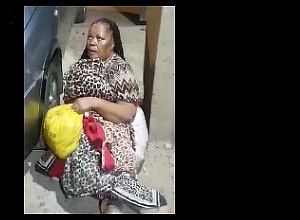A wrap often worn by sangomas (ibhayi) and wandering in a stranger’s yard was all it took for Jostina Kate Sangweni to be branded a witch and beaten to death. According to a ThoughtLeader report, the killing of the 58-year-old schizophrenic woman last month cast the spotlight on ignorance about mental health issues in society.
Sangweni’s last moments alive were captured in a video that went viral on social media at the end of March, shortly after the incident. Her son-in-law, Jabu Moagi, told how the tragedy unfolded.
In the two-minute-long video clip, two men can be heard accusing her of being a witch after finding her in their yard. Sitting on the ground, a visibly shaken Sangweni pleads for forgiveness as she is confronted by one of the men.
Clutching a plastic bag, she explains that she is hiding from someone who is trying to shoot her. Another man is heard speaking on the phone, telling someone they have discovered a witch on the premises. Sangweni is seen being insulted and assaulted, with one of the accused spitting on her as she maintains that she is not a witch and pleads for forgiveness.
The two men can be heard threatening to shoot and set her alight.
Moagi said in February, he received a message from Sangweni's stepchildren from Phomolo on the East Rand telling him she seemed to be losing her mind as she did not look well. “At the end of February, we arranged for her to be brought home, in Soweto. When she came home, we could see the situation was bad. She would sit and cover herself with a blanket for about an hour. She also spoke to herself often and it didn’t seem normal. She was getting worse.”
On 1 March, the family took her to a doctor in private practice. She was diagnosed with schizophrenia. Her family were given a reference letter to Chris Hani Baragwanath Hospital. From there, they were told to rather go to a clinic, as the hospital did not take referrals from private doctors.
“We took her to Zola Clinic where an examination was conducted on her, and a prescription was also given,” said Moagi, adding that the medicine calmed her but had its side effects.
Moagi said the family decided to take Sangweni to an initiation school in Mapetla on 24 March, as her mental health deteriorated. On March 26, Moagi received a call at around 11am, informing him that she had gone missing.
“After looking for her, we decided to go to the police station. We were asked to describe her. The police then took the picture we showed them and left us for two minutes, to confirm details. They came back and told us, ‘there’s a person who fits this description who was almost burnt by a mob’.
“We quickly drove to the scene and saw that she was beaten up and restrained (her feet were tied),” Moagi said, adding that her entire face had sustained serious injuries. Two men were arrested. Moagi said they rushed her to Bheki Mlangeni District Hospital, where she was transferred to Baragwanath Hospital. She died a few days later on 5 April.
According to Moagi, Sangweni was a registered traditional healer but was no longer practising as one. “Mental health will be another pandemic we are facing in this country. There is a threat to our traditional healers and sangomas. We in black communities don’t understand what mental health is. The language we use perpetuates further harm and misconceptions around mental health.
The national co-ordinator of the Traditional Healers Organisation, Bakhombisile Maseko, said mental health needed to be handled sensitively in the traditional healing space. “We are losing our gogos and sangomas to mob attacks because of lack of information and at times ignorance. Government has the resources to help us aid mental health initiatives in our communities,” she said.
Maseko added that it was important for traditional healers to be seen as healers who are part of communities, and for negative perceptions to be dealt with to make them less vulnerable.
Meanwhile, psychiatrist Dr Gwen Tonyane said there was a shortage of mental health practitioners all over the world and South Africa had one of the worst doctor-to-patient ratios across all specialities. with psychiatry ranks among the lowest.
Tonyane said it was tragic that even when help is within reach, the stigma of mental health was so entrenched in the African community that people would rather brutally beat someone to death than to get them help.
“My wish is that mental health will be made a health priority alongside HIV, TB and maternal health by our government, and our patients will finally have the dignity they deserve. Mental health is as important as physical health,” said Tonyane.

